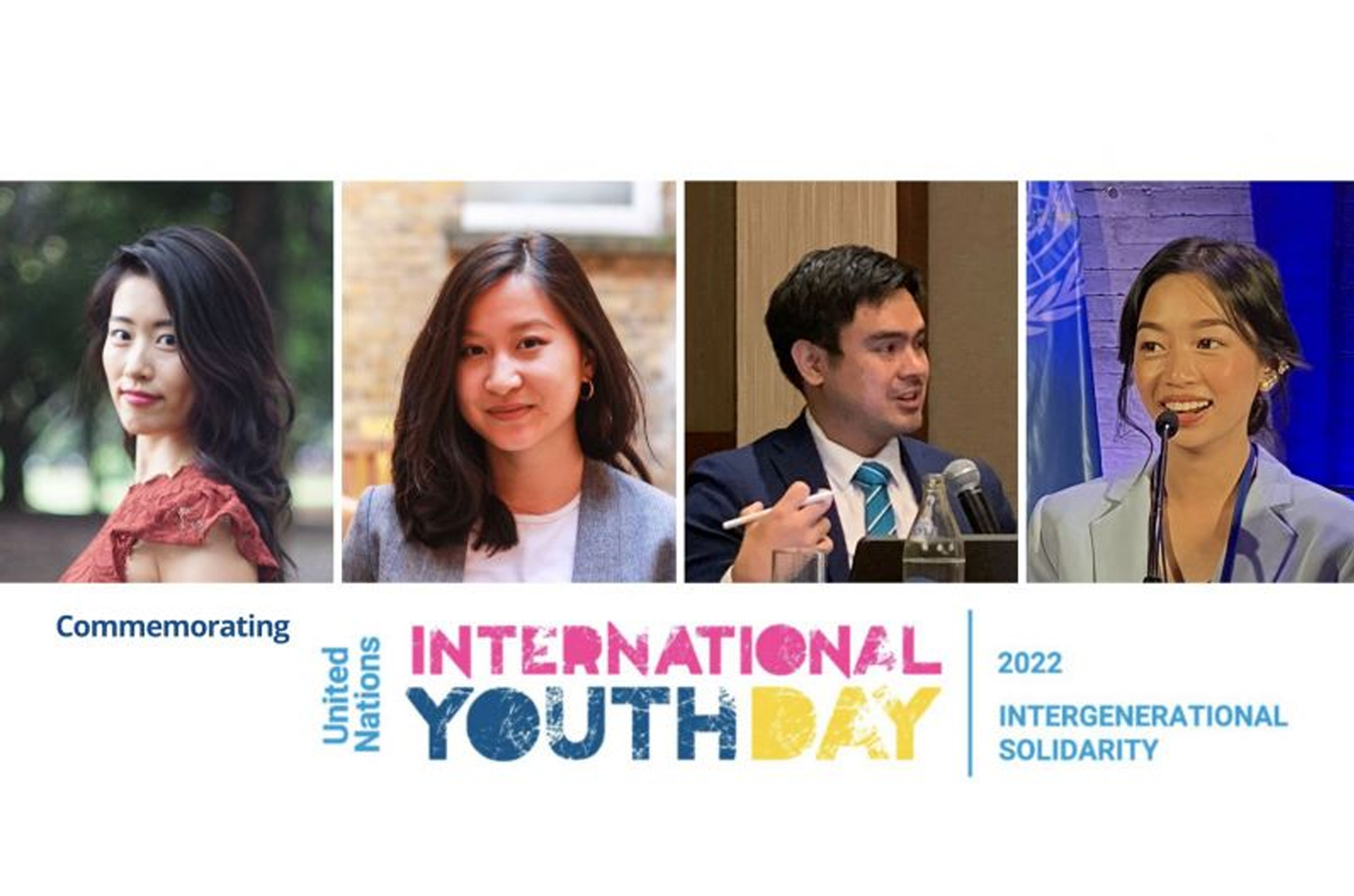
.jpg)
Commemorating International Youth Day (IYD) and its 2022 theme, ‘Intergenerational Solidarity: Creating a World for All’, UNESCO and its dynamic youth partners are advocating for intergenerational solidarity and meaningful youth engagement in recovering and transforming quality education which is inclusive of all in the post-pandemic era.
International Youth Day is commemorated every 12 August worldwide to recognize youth voices and achievements through various platforms. Fostering intergenerational collaboration and addressing a persistent problem of ageism against youth are essential for successfully advancing the UN 2030 Sustainable Development Agenda, ensuring that no one is left behind. To achieve the aspirational targets of Sustainable Development Goal 4 (SDG4) on education, UNESCO’s Asia-Pacific Regional Bureau for Education (UNESCO Bangkok) has collaborated youth in recent high-level key events, such as the 2nd Asia-Pacific Regional Education Minister's Conference (APREMC-II), held in Bangkok and online from 5 through 7 June 2022, and the upcoming Transforming Education Summit (TES), of September 2022, highlighting youth-adult partnerships for inclusive, quality education.
To spotlight youth engagement, leadership and advocacy on SDG 4 in Asia and the Pacific, UNESCO Bangkok recently interviewed four dedicated youth advocates from the region who have been involved in APREMC-II and the imminent TES. UNESCO invited these youth leaders to highlight issues of key concern to them, such as having access to important platforms that drive decision making on the SDGs and being recognized for their inherent diversity.
.jpg)
.jpg)
To strengthen intergenerational youth-adult partnerships, an inclusive and sustainable society is called for by Asia-Pacific youth, as elaborated in Youth Statement: Our Education, Our Experience (hereafter ‘Statement’), issued in conjunction with the APREMC-II outcome Bangkok Statement 2022. The Statement was presented at the high-level segment of APREMC-II and calls for action in four key focus areas:
- Ensuring sustainable learning for life and upholding the universal right to education;
- Curriculum transformation for the twenty-first century, in view of building the foundations for a responsive and agile education system that responds to the needs of youth, society and the economy;
- Protecting student safety and facilitating youth empowerment; and,
- Funding education and ensuring that teaching is an attractive, quality profession.

Prior to the presentation of the Statement, and with the support of UNESCO and UNICEF, a regional, virtual Youth Consultation was hosted by the APREMC-II Youth Steering Committee to discuss young people’s priorities, needs and expectations on the conference theme, ‘Education Recovery and Transformation towards more Responsive, Relevant and Resilient Education Systems: Accelerating Progress towards SDG 4-Education 2030’. This consultation brought together more than 20 representatives of youth-led organisations and young education activists from across the region ranging in age from 18 to 30 years. These voices all contributed to the Statement, among them, four youth leaders who shepherded the process: Yuki Hosoya, of the Youth Committee of theJapanese National Commission for UNESCO; Elana Wong, from the independent global Migration Youth and Children Platform (MYCP); Maria Nguyen, of the UNESCO-sponsored SDG4Youth Network; and Iking Corpus, Masters of Arts candidate in Global Human Development, Georgetown University School of Foreign Service.
![[APREMC-II] was an excellent example of youth-adult partnership. It continues to provide a model for executing policy discussions that lead to actionable recommendations. —Iking Corpus, the Philippines, MA candidate in Global Human Development, Georgetown University School of Foreign Service](https://bangkok.unesco.org/sites/default/files/assets/article/Education%20for%20Health%20and%20Well-being/images/IYD_Quote%20(1).jpg)
.jpg)
Youth representatives from across Asia and the Pacific were also engaged in the technical segment of APREMC-II. Participating youth contributed as speakers on four different thematic sessions, including Digital Transformation; Higher Education and Adult Education; Transformative Education (ESD, GCED, Health and Wellbeing); and Adolescent and Youth Education, Learning and Skill.

Engaging youth in dialogue on the prevalence of anti-youth ageism – this year’s International Youth Day points out its prevalence as a factor holding back youth from exercising their full potential – could help address a current ‘intergeneration gap’, as noted by participants Iking Corpus and Maria Nguyen. This kind of dialogue could provide opportunities for young people to connect with generations other than their own, thereby helping to promote a common understanding and greater sense of solidarity. For instance, youth leaders from across the world were engaged in the TES Pre-Summit and its intergenerational discussion during 28 to 30 June 2022, specifically in Youth Forum on the global engagement day of the summit.

Looking ahead, as plans for youth engagement move forward in order to inform the upcoming Transforming Education Summit at UN Headquarters in New York in September, youth perspective on issues of the summit’s Action Track 1 on ‘Inclusive, Equitable, Safe and Healthy Schools’– have been summoned through an open-access, online platform (https://transformingeducationsummit.sdg4education2030.org) that serves as a knowledge hub for collecting ‘best practices’. This particular action track covers matters on inclusion and equity, gender-transformative education, safe schools, school health and nutrition, and education in emergencies and protracted crises – all of which have been identified by Asia-Pacific youth as priorities for the region, and for which young people need to be further empowered and better resourced to address, together with their peers and allies in older generations.
.jpg)
.jpg)
It has become clear in recent years that youth-adult partnerships are critical to strengthening intergenerational solidarity, to building peaceful and resilient societies where individuals of all ages feel valued and included, and to raising public awareness on the issues and challenges of age-related discrimination. UNESCO and its partners have been assiduously working toward quality and inclusive education for all, ensuring enabling, respectful and positive learning environments for students and school communities, not only regionally, but worldwide. Transformative education, delivered through transformed education systems is key to enabling generations of any age to understand and respond to the intergenerational gap threatening to divide us.
.jpg)
By Worapot Yodpet, Junior Project Consultant, and Jenelle Babb, Regional Advisor, Education for Health and Wellbeing Team, Section of Inclusive Quality Education (IQE), UNESCO Asia and Pacific Regional Bureau for Education (UNESCO Bangkok)


